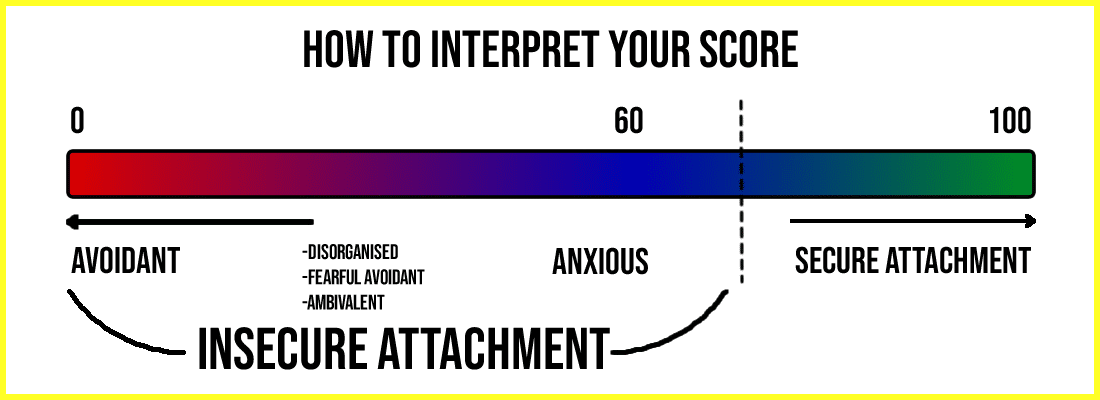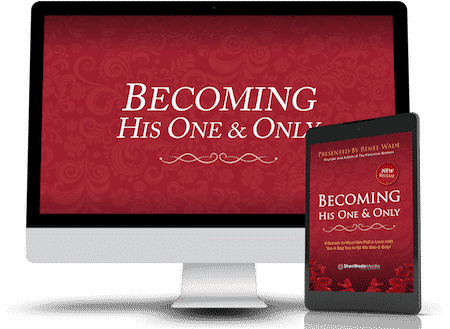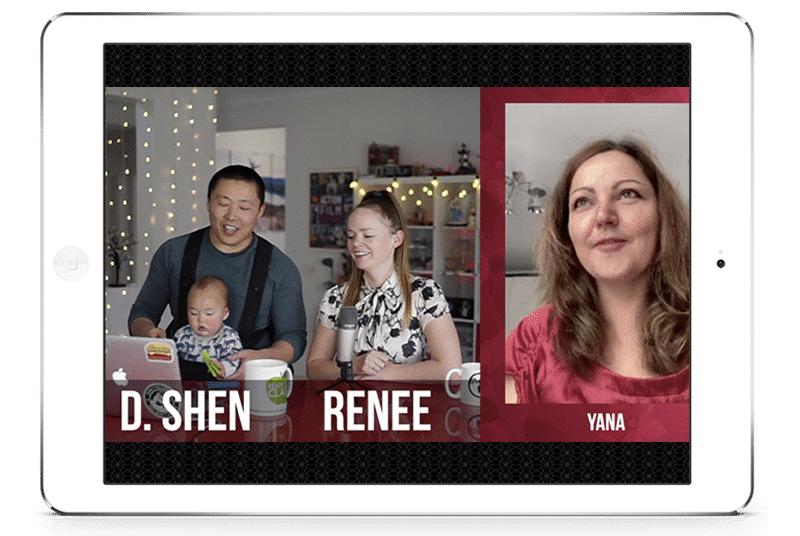Extended Quiz Result Explanation:
What is my real core Attachment Style? (...And what does it really mean for my intimate relationships?)
Hey it's us, Renee Wade & D. Shen here the co-founders of Shen Wade Media, (and TheFeminineWoman.com as well as CommitmentTriggers.com.)
Thanks for doing our Attachment Style quiz. You’ve made a great choice to research and learn about the framework of attachment styles. This is one of those profound areas that will fundamentally change the way you think about love and relationships.
No doubt you’ve received your score from the quiz. Keep reading and we will explain how to interpret this score.

You may have been expecting the answer to this quiz to be a specific category of attachment style, ie, anxious, avoidant, disorganised etc… However it is in our firm opinion that we should see this framework of attachment style not as categories but as a sliding scale or a spectrum.
After all, our attachment style is plastic in the sense that it can be influenced and changed over time. It’s not static. Also you may experience a combination of different categories of attachment styles, which is perfectly normal.
As you go through this analysis, you’ll start to realise the power of seeing this framework as a sliding scale rather than strict & separate categories.
By the way, from now on let’s use the phrase attachment patterns, instead of attachment styles. (No disrespect to Bowlby who was the first to coin the term attachment styles back in the 1970s.)
The word styles give the connotation that perhaps we get to easily choose how we attach like changing an outfit.
Nothing could be further from the truth.
The truth behind your Attachment Patterns
These attachment patterns that we’re going to discuss are deep seated neurological patterns we have developed since infancy. As such, they have tremendous power over our decision making when it comes to relationships and intimacy.
Chances are, the attachment patterns you have right now, are exactly the same attachment patterns you had when you were just 2 years old. They operate on such a subconscious level that these patterns are almost impossible to change unless you put in a dedicated conscious effort to change them.
If we had the constant nurturing and affection of our caregiver (usually our mother), then we slowly develop a sense of secure attachment. As a result, we trust intimacy, we trust relationships and we trust that we are worthy of being loved.
If for whatever reason we as infants lacked this sense of constant nurturing and affection, then this is where insecure attachment creeps in, in other words, we didn’t receive the necessary nurture and affection that is required for secure attachment to form.
Insecure attachment patterns are formed from stress & trauma
So the best way to think of insecure attachment is to see it as a form of PTSD, post traumatic stress disorder. In other words, we resort to these insecure attachment patterns as coping mechanisms due to extreme stress.
When we talk about attachment patterns, there are two broad categories. Secure attachment, and insecure attachment. (There are many subcategories of insecure attachment we’ll discuss later.)
If you have secure attachment patterns, you would find relationships and relating to people easy. You have a healthy desire to connect with people.
You feel more worthy of love… because someone loved you enough to nurture you as a baby. You see intimacy as a beautiful thing.
As my wife Renee (who has lived most of her life with insecure attachment patterns) would say… if you have secure attachment patterns, it’s like having a golden ticket. You don’t really know how lucky you are.
The world experienced by someone with insecure attachment patterns is very different.
If you have predominantly anxious attachment patterns, then you would often be completely preoccupied with your relationships and worry that you may lose love around every corner.
If you have predominantly avoidant attachment patterns, then you would find yourself gravitating away from intimacy and closeness. It may even feel suffocating to you. As a result, you may subconsciously push your partner away when they want closeness.
So in order for you to truly understand how your attachment patterns affect you and all your relationships, let’s give you a quick rundown of this important concept and framework.
Where your attachment patterns came from…
For a moment, imagine yourself as an infant.
If you didn’t get the affection and nurture you needed, your job as a baby is to cry for it. If your cry worked and your caregiver came to offer you affection and nurture, then the cry has done its job.
However, if nobody came, then your natural impulse as an infant is to cry harder, louder and with more distress.
If you’ve ever had the wonderful privilege of taking care of a baby, you’d know that babies are capable of crying for hours and hours without stopping. It’s not uncommon to hear stories of babies crying until they go blue in the face or until they vomited.
Because in the real world without real nurture and affection, they are as good as dead. So babies have to fight to gain that nurture and affection with everything they have.
As an infant, if your caregiver was inconsistent in responding to you and you couldn’t rely on your source of nurture and affection to be there when you need it, then that is where anxiety begins. You become anxious because you have no certainty in the future.
You become anxious because you have no certainty that you will even survive the next week, month or year. Will my caregiver be there the next time? And the next time after that?
Your anxiety as a way to cope with uncertainty
So anxiety is a way to cope with the irregular and often unpredictable responses from our caregiver. Anxiety allows you to go from 0 to 100 in distress quickly, in the hope that you might get a quick response from your caregiver.
If you get anxious quickly, especially when it comes to intimate relationships, then this is the root of the problem.
If we as babies happened to get punished for our anxious behaviour, then we become more likely to push down our need to call out for help.
Deep down inside we really want and need the nurture and affection but on the surface we learn to hide it and make it wrong. This creates conflicting and contradicting behaviours, sometimes with episodes of unprovoked anger outbursts.
Other authors often use the terms fearful avoidant, ambivalent or disorganised attachment to describe this conflicting behaviour. The essence of it is that you feel like it’s wrong to need intimacy or nurture, thus you sabotage your own attempts.
See, an anxious attachment pattern is an attempt to recapture the lost nurture through a large and overwhelming stress response. It’s your nervous system saying to you… “there’s still hope in getting that affection and nurture, we just have to work really hard because it’s a real emergency.”
Your avoidance as a way to cope with a lack of hope.
However, if you as an infant failed to get any affection and nurture even after hours (or God forbid days) of distress, then we enter into the realm of avoidant attachment pattern.
This is the most severe type of insecure attachment and the most difficult to remedy.
The reason why infants begin this type of coping mechanism is because they’ve given up hope in ever getting that nurture that they desperately needed. This is the bodies’ last ditched effort in trying to preserve life in the form of not wasting any excess metabolic energy.
In other words, in order to survive, the little infant’s body had decided to indefinitely postpone the development of secure attachment.
If the neglect was severe enough, then true psychopathic tendencies start to form. These children grow up with little to no ability for empathy, and very stunted emotional development.
In other words, you could describe these children to be emotionally cold, even if they have learned to do the socially appropriate “things”.
(There has been many documented studies on this process of becoming avoidantly attached and even psychopathic from different orphanages for abandoned babies.)
The more avoidantly attached a person is, the harder it is to connect with them, to help them heal or even to relate to them. Sometimes on the outside they’re an adult but emotionally they’ve been stunted as an infant.
Essentially they’ve put up so many metaphorical walls around themselves that no rescue team could ever reach them.
This is why avoidant attachment is on the end of the spectrum. This is by far the worst insecure attachment pattern.
The pendulum between anxiety and avoidance.
Now that we’ve talked about the subcategories of insecure attachment - here’s my contention:
Every anxiously attached individual also has avoidant patterns too. And vice versa, for most avoidantly attached people, they also have moments of anxious attachment. (Unless they are truly 100% psychopathic.)
Here’s why.
When you go to anxiety, your nervous system is hyper-aroused. (Not in the sexual arousal way but in the hyper-activated way.) Eventually you’ll get sick & tired of being anxious, so you swing the pendulum and become more despondent.
After all, your nervous system needs a break.
And that “break” may seem like you’re zoned out, absent or avoidantly attached.
This is the reason I don’t like to pigeon-hole anyone into a particular category. Of course, you will have your own centre of gravity, eg you may go to anxious 80 percent of the time and avoidant 20 percent.
This is why we’ve designed our results to the quiz as a sliding scale, or a fluid spectrum, rather than pure categories.
On one end, there is secure attachment. According to some studies, about half of the population is securely attached. As you move down on this sliding scale, we move into the world of insecure attachment, and the first step is anxious attachment.
As the anxious attachment becomes more severe, it gives rise to other sub-categories such as ambivalent or disorganised. And eventually if the nurturing was lacking so greatly, you eventually enter the realm of avoidant attachment patterns.
So now that you understand some basics of the different types of attachment patterns, let’s look at your quiz results and talk about the finer implications of your answers.
Question 1, When it comes to relating to people in general…
If you believe that people are generally dependable and kind, it means that you have a natural inclination to trust people and trust relationships. This happens when you are securely attached.
If you get attached to people easily and often get hurt or people let you down, this is a common experience of those who are anxiously attached.
One of the reasons why you attach to people easily is because your subconscious is making an attempt to keep that person around longer in your life. It’s almost as if out of fear you’re trying to “speed up” the relationship building process.
Of course that also means you aren’t as calibrated to the relationship building process and it most often will backfire on you.
If you believe that you can’t trust anyone, then it’s a sign that you may have avoidant attachment tendencies. This is also true if you feel like people will always come and go.
These beliefs also prevent you from truly committing yourself to others.
Question 2, To me, the word intimacy intuitively feels…
Now that you have a greater understanding of the framework of attachment patterns, you should be able to easily put these answers into the appropriate attachment pattern.
If intimacy feels foreign, it’s a sign of avoidant attachment.
If intimacy feels scary, it’s a sign of anxious attachment.
If intimacy feels warm, that’s a sign of secure attachment.
If intimacy makes you feel angry, it’s a sign of disorganised or ambivalent attachment, which is a combination of anxious and avoidant.
Sometimes we feel angry because we feel like we were robbed of the care and nurture that we deserved or should have had.
Question 3, in my relationship, I tend to constantly…
If you constantly worry that your partner will stop loving you one day, that is a typical sign of anxious attachment.
If you feel repelled when your partner gets too intimate or close to you, then that’s a typical sign of avoidant attachment.
If you love to learn more about your partner without their fear of judgment, then that is a sign of secure attachment.
If you constantly look for faults in your partner, then it can often be a sign of a mixture of anxious and avoidant attachment.
Question 4, in my partner’s absence, I…
If you predominantly look forward to seeing your partner again, then that’s an indication that you’re securely attached.
If you feel anxious and don’t know what to do, as you can imagine, that’s a sign of anxious attachment.
If you feel incomplete, that’s also a sign of anxious attachment.
If you somehow feel more free, then this indicates you may have avoidant attachment patterns.
Question 5, In my most ideal relationship…
If you prefer to have your own lives and wouldn’t have to depend on each other, then that’s a big sign that you have avoidant attachment patterns.
I believe it is very normal (when we have received the constant nurture we need from a young age) to feel like we should and need to depend on each other in relationships.
That dependence is healthy, normal and something to embrace. After all, a solid relationship is formed when you can depend on each other.
If you prefer in your most ideal relationship that you would receive constant love and attention, that is usually a sign of anxious attachment. Sure, constant love and attention is nice to those who are securely attached, but it’s not the most important thing.
If you prefer to be deeply connected above all else, then that is a sign of secure attachment.
If you prefer to have more control in your relationship, that’s typically a sign of anxious attachment patterns. (Because being anxious means you’re constantly searching for certainty, and you become more controlling in search of that certainty.)
Question 6, If a man that I was interested in started to banter with me…
If you are able to effortlessly banter back, in a way that is calibrated and in a way that continues the flow of banter, then that is a big sign of secure attachment.
(The key here is that this banter has to be spontaneous and not some “pre-scripted” lines.)
See, this idea of banter is a social skill that we only develop as kids if we are securely attached, as we feel at ease with relationships. This is what I would call an advanced social skill that we humans learn as a way to help us accurately navigate through the many relationships we all have to manage in our lives.
If you freeze and don’t know what to say back to a man’s banter, then that is a typical sign of anxious attachment. In other words, when you are conditioned to have any form of insecure attachment patterns, you don’t have the necessary resources to develop the appropriate banter skills from a young age.
However, even if you are extremely anxious, you may still have the desire deep down to want to banter, even if you freeze and don’t know where to begin. (That’s a great sign and you should explore that.)
After all, this is a skill, and it takes time to become good at it.
If you try to avoid the banter altogether, then this could be a sign of avoidant attachment.
By the way, the art of banter is also a great way for you to help yourself attract more securely attached people into your life as well as help you weed out the wrong types of men. It is by far one of the most important skills for you to have as a woman.
If you haven’t attended our FREE class on the dark feminine art of banter, and why how it can completely transform your interactions with men, then here’s a link to get the class.
Question 7, If I suspect that my partner has been cheating on me…
If you are one of those who would rather not know about your partner potentially cheating on you, then it’s very likely you have avoidant attachment patterns.
If you would ask them until they confess, then this is typically a sign of anxious attachment patterns.
Remember, anxious patterns seek certainty.
If you’d investigate without prematurely coming to conclusions, then that’s how securely attached people would typically act. They stay relatively calm and calibrated to the amount of information they have.
If you’d get instantly stressed out and perhaps even angry, then that’s also a sign of being anxiously attached and even disorganised.
Question 8, When it comes to sex… I’d rather have…
If you prefer casual sex with uncommitted partners, then that’s a sign of being avoidantly attached.
This is true even with men.
Men who are securely attached would almost always prefer intimate sex with a committed partner over casual sex with uncommitted partners when given the choice.
This isn’t to say that men don’t have casual sex or they don’t like casual sex, not at all.
This is a direct side by side comparison between the two choices. Of course, for most adult men whom are producing millions of sperm per hour, sex is almost always better than no sex.
The reason why securely attached people would prefer intimate sex is because that intimacy adds many deeper and more fulfilling layers to the mere act of sex. Remember, securely attached individuals have a centre of gravity around intimacy.
If you’d rather avoid sex altogether, then perhaps there are other anxiety issues standing in the way.
Question 9, If I share my deepest feelings and thoughts…
If you feel that perhaps no one would care, or that people may no longer love you, then these are signs of anxious attachment.
If you feel like perhaps you can resonate with the deepest feelings of others, then this is a sign of healthy secure attachment. It’s a sign that our caregivers helped to moderate our emotions as babies and did not make our feelings wrong.
If you simply would never share your deepest feelings, then you may have patterns of avoidant attachment. Not only do you avoid your own deepest feelings, but you may also avoid other people’s deepest feelings.
Question 10, If someone I’m dating suddenly becomes cold and distant…
If you feel indifferent, perhaps even relieved that they’ll need less from you, then that’s a sign of avoidant attachment.
If you feel like you’ve perhaps done something wrong or that they’ve found someone new, then this is typical anxious attachment behaviour.
If you feel angry and vengeful, that is also a sign of anxious attachment.
If you feel like you need to delve deeper into the situation without feeling sorry for yourself, then that is how securely attached people naturally deal with these situations.
Now that we’ve given you a thorough explanation of the quiz results as well as the framework of attachment patterns, you might be wondering… what does my score mean?
What does my score mean?
If you scored more than 60 points on the quiz, then congratulations, you have predominantly secure attachment patterns.
As someone who is securely attached, you won’t have to experience the plethora of negative, self-sabotaging and even debilitating patterns that individuals with insecure attachment patterns have to go through.
You may not even relate to them.
Anything below 60 means you have insecure attachment patterns. The lower the score, the worse these patterns are.
If you scored between 30 to 60 points, then that puts you in the anxious attachment part of the spectrum. This could also include sub-categories such as fearful avoidant, disorganised or ambivalent.
If you scored below 30 points, then you are predominately avoidantly attached. This is by far the more severe type of insecure attachment pattern and requires more energy, effort and resources to heal.
Remember this is a spectrum, and not just hard and fast categories.

Healing from insecure attachment patterns…
Typically as you start to heal your insecure attachment styles, you find yourself slowly sliding back up this spectrum. As such, you will sometimes have to experience the “symptoms” of the categories you’re travelling through.
In other words, you don’t magically go from one end of this attachment pattern spectrum to the other. You have to travel through the other categories along the way.
So for someone completely avoidantly attached, they may go through periods of having extreme anger as they start to heal. This anger comes from them now becoming more connected to themselves and from associating emotionally with the fact that they didn’t have the care and nurture they absolutely needed as infants.
As they process their anger over time and feel more connected to themselves, they gain more desire to connect with others and as such anxiety now takes over.
How do you truly connect deeply with others? And how do you do it without fear of judgment or loss of love? This process can be scary, especially when you haven’t practiced it in a long time.
This is almost always going to cause some level of anxiety, and that’s OK.
Sometimes this may feel wrong, but this is indeed a sign of progress. Remember, being anxiously attached is actually much healthier as an attachment pattern than being avoidantly attached.
When you’re anxiously attached, you still have hope that you can make that deeper connection with others. That hope in itself is valuable and crucial to your healing.
So make sure that you are not discouraged when you start to feel anxiety coming on. Sometimes real progress looks like taking a step back.
5 reasons to consciously cultivate secure attachment…
If you do not have secure attachment patterns right now, then your job is to help yourself create, cultivate, and establish that sense of secure attachment.
Out of all the directions you can take in your own growth and self development, this (in our opinion) is the single most important focus.
Here are 5 good reasons why…
1. True happiness and fulfilment in your life will be a direct reflection of the quality of the relationships in your life. And your relationships are largely determined by your attachment patterns.
2. You’ll find that your relationship with yourself will become better as you’re more able to heal your inner child through the process of healing your attachment patterns.
3. You’ll find that you will no longer subconsciously sabotage your relationships and unnecessarily create disconnects with the closest people in your life.
4. You’ll find that as you start to heal your attachment patterns, other emotional blockages will clear up and you’ll able to effectively process those bottled up emotions that have been niggling in the back of your soul.
5. As you start to heal, you will also be in a better position to attract a healthy securely attached lover and partner in your life, without having to be overly needy. As you become more securely attached yourself, you will also be able to have healthier and more exciting interactions with men.
You are much greater than your attachment pattern…
Now, these may all sound good, but know that this process of healing isn’t easy. It will require you to do some really hard emotional work.
But it is possible to heal, as attachment patterns are stable yet plastic.
In other words, it may FEEL like you are just naturally “this way”, but that’s only because you’ve been this way from a young age. Your attachment patterns do not define who you are.
You are much greater than the attachment patterns you inherited.
Plus you are an adult now, and as such, you have the awareness and power to change your neurological conditioning.
We will talk about the exact steps to heal your own insecure attachment patterns in the future. But for now, just know that whatever insecure attachment patterns you have right at this moment, it can be healed over time.
There’s no need to feel guilt, shame or a sense of unworthiness, even when you have a habit of feeling these emotions.
If you didn’t get the opportunity to develop secure attachment from a young age, you can give yourself that opportunity now.
We’re not promising an overnight transformation, but we know for a fact it can be healed over time.
Right now we are putting together a program for you to cultivate secure attachment within yourself. When it is released, we will inform you via email.
In the meantime, you’re welcome to study the many articles we have on this important topic of attachment styles, as well as check out some of our existing home study programs.
Because ultimately the more you learn, the more powerful you become. We want to give you the best knowledge, awareness and skills in order for you to attract and keep amazing relationships in your life.
CLICK HERE to see a list of all of our online study programs.
Here is a small selection of programs that may really help you...
If you want to learn exactly what "values" to lead with in order to inspire the deepest commitment and investment in your chosen man, then check out our Becoming His One & Only course.
The promise of this course is for you to have your chosen man fall in love with you & beg you to be his one & only by embodying these 5 feminine secrets, even if he’s been distant, avoidant, or losing interest…
CLICK HERE to read more about "Becoming His One & Only".
If you want to learn the mindset behind being an intrinsically high value woman, then consider checking out our High Value Mindset program.
The promise of this program is to give you the ability to “trade in” your anxiety and insecurities for self esteem, self worth and intrinsic confidence, so that no one will ever take you for granted & high value men will recognise you as an indispensable “keeper”.
CLICK HERE to read more about High Value Mindset.
If you want to have a deep dive into the masculine perspective, and learn what they look for in a woman that they want for a lifetime, then check out our Understanding Men course.
The promise of this course is for you discover the secrets of the masculine perspective so that you can get through to any man, connect with him heart to heart, and inspire his deepest loyalty and commitment.
CLICK HERE to read more on our Understanding Men Course.
That's all from us for now.
Sending you bucketfuls of love.

P.S. We have written quite a few articles on attachment patterns, it's worth your time to bookmark these pages and go through them in your own time. The more you understand this framework, the more power you'll have in helping yourself cultivate secure attachment within yourself.
4 Types Of Attachment Styles In Relationships: Which One’s Yours?
How To Self Soothe Anxious Attachment In 2 Easy Steps.
11 Genius Ways To Communicate To An Avoidant Partner.
15 Signs Of Abandonment Issues & How To Test For Them.
8 Signs An Avoidant Loves You & How To Inspire More Of It.
Avoidant Attachment: Causes & 8 Obvious Signs You Have It.
Disorganised Attachment Style: Beware The 8 Signs You Have It & What To Do.
Fearful Avoidant Attachment Style: 10 Signs & How To Heal.
13 Proven Signs Of Attachment Issues In Adults & How To Fix It For Good.
Preoccupied Attachment Style: Beware The 8 Signs You Have It.
How To Overcome Anxious Preoccupied Attachment: 7 Proven Steps.
Recommended Programs

The promise of this course is for you to have your chosen man fall in love with you & beg you to be his one & only by embodying these 5 feminine secrets, even if he’s been distant, avoidant, or losing interest…

The promise of this course is for you discover the secrets of the masculine perspective so that you can get through to any man, connect with him heart to heart, and inspire his deepest loyalty and commitment.
Leave a comment & share with all of us what attachment patterns you have and how that has affected your life and your relationships...
Fast Track Your Progress by Watching These Case Studies
The best way is to always learn from other people's experiences.

Alena's Case Study
Discover how the introverted Alena got her man to ask her out almost instantly and for the very first time in her life, she started attracting highly esteemed men & making real progress in overcoming her own anxious attachment patterns... All by using this dark feminine art of banter. (...Even when she was completely skeptical to begin with!)

Alison's Case Study
Discover how Alison ended her cycle of abusive relationships by learning to quickly weed out the "wrong types of men", inspiring deep devotion from her chosen man and passing the hardest test of them all - an accidental pregnancy after a month of dating! (...All because of one simple skill every woman should have.)

Yana's Case Study
From icebreaker to engagement in just 8 months… Discover the exact steps Yana took and the specific banter lines she used in order to attract the man of her life online and inspired him to propose after a short 8 months. (And then married within another 2 months…)

Kristin's Case Study
Learn how Kristin went from being completely burnt out with online dating, sick of getting ghosted & exhausted from giving her heart and soul with nothing in return... to having high value men begging for her attention & having the most "electric" date of her entire life. (...All by changing one simple thing.)
Shen wade media
We believe that every single one of us deserve love. We deserve to experience the feelings of warmth, connectedness and passion. It is our mission to give you the strength, the skills and the wisdom to achieve that for yourself, even if you have just hit rock bottom and lost all faith.
About
More Info
© Copyright Shen Group International Limited. All Rights Reserved
